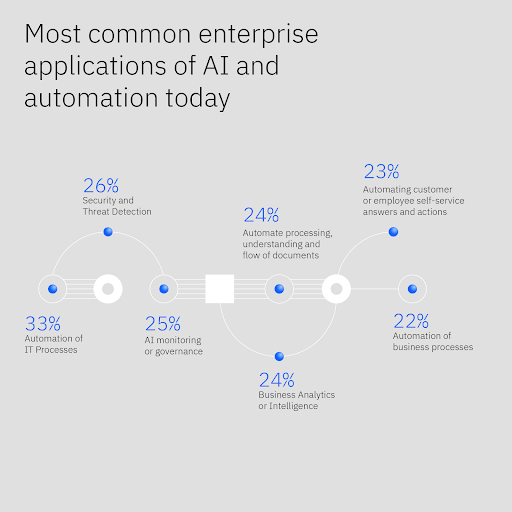In the past few years, AI has quietly worked its way into just about everything, from customer service chats to analytics. If you’re building or running a SaaS product, it’s no longer something you can afford to ignore. The future of AI in SaaS is moving fast, and staying competitive means keeping up with the trends and knowing how to adapt in smart, strategic ways.
I’ve been tracking these developments closely, and what excites me most is how AI enables SaaS platforms to solve business problems in ways that weren’t possible just a few years ago.
It helps with faster decision-making, personalized customer experiences, smarter automation, and better data insights. But beyond the hype, what does the future of AI in SaaS look like, and is it worth your time?
In this post, I’ll explore the future of AI in SaaS by highlighting five key trends, from advanced personalization to predictive analytics, that are actively reshaping the landscape. You’ll also get tips and tools to stay ahead.
Let’s get into it.
1. The Rise of AI-Powered Personalization
Personalization used to mean adding someone’s name to an email. Today, it involves using behavioral data, product usage, and intent signals to create tailored customer experiences.
Understanding the future of AI in SaaS enables you to analyze user behavior in real-time and suggest the next best action. For example, Netflix recommends content based on what you’ve watched, skipped, or rewatched. SaaS companies can use that same approach for a project management platform or a B2B CRM.
According to Attrock, AI solutions can enhance platform performance by delivering personalized recommendations and customer interactions.
For instance, if a user frequently visits certain knowledge base articles, your app can automatically suggest related features or support tools. You can also use AI to segment users based on intent or behavior, not just demographics. Dynamic content and triggered onboarding sequences based on actions can increase conversion and retention.
2. Increasing Use of AI for Automation
Repetitive tasks kill productivity. That’s where AI shines. Whether it’s marketing automation, email follow-ups, or customer segmentation, AI helps SaaS platforms operate smarter, not harder.
Use cases:
- AI-powered CRMs can prioritize leads based on behavior and engagement
- Marketing tools can automatically launch nurture campaigns based on where users are in the B2B sales funnel
- AI apps can tag and route support tickets to the right team based on content, urgency, and sentiment
In fact, according to IBM’s global AI adoption index, 33% of enterprises use AI to automate IT processes, while 22% use it to automate business processes.

Here’s a good place to start: Identify which tasks your team repeats daily. It could be manual data entry, report generation, or customer ticket triage. Then look into AI-powered tools that solve those pain points.
As the future of AI in SaaS continues to unfold, teams can utilize DIY AI Teammates for Slack/Teams/Zendesk to collaborate with AI bots that handle queries or routine tasks right inside your workspace. Internal processes that used to take hours of manual work can now be completed with greater accuracy in seconds.
3. Use of AI in Analytics & Reporting
Data without insights is just numbers. The future of AI in SaaS is transforming how businesses extract meaningful intelligence from their data. You no longer need to spend hours slicing spreadsheets or SQL querying databases. AI can quickly analyze vast amounts of data and instantly highlight the most important insights.
Modern SaaS platforms use AI to:
- Detect patterns in customer behavior
- Automatically flag anomalies in KPIs
- Predict lifetime value or churn risk based on usage trends
- Generate natural language explanations of complex data trends
- Provide predictive insights rather than just historical reporting
- Create visual representations that make data more accessible to non-technical users
The result is you spend less time wrestling with data and more time acting on insights that drive growth.
4. Improved Predictive Analytics
Predictive models used to be reserved for enterprise teams with data scientists. Now, no-code AI tools allow SaaS platforms to predict user churn, forecast MRR, or even upsell opportunities based on subtle behavioral signals.
For example, if a user uses fewer features, logs in less, or stops responding, AI can spot these signs and alert your customer success team before they cancel.
On the other hand, if usage spikes for a certain feature, you can automatically pitch an upgrade plan tailored to their needs. As the future of AI in SaaS continues to evolve, these predictive capabilities will only become more advanced.
5. Increasing Popularity of AI Chatbots
AI chatbots are everywhere, and for good reason. They provide instant, 24/7 support, reduce ticket volume, and improve customer satisfaction. Tools like Salesforce’s Einstein Assistant or Zoho’s Zia can handle common queries, onboard new users, and even schedule meetings without human intervention.
As the future of AI in SaaS continues to progress, chatbots are evolving beyond clunky decision trees. With natural language processing, they understand context, intent, and tone. And the more they interact with your users, the smarter they get.
You don’t need a massive engineering team to get started, either. Plenty of chatbot builders integrate directly with your existing platforms. For extra polish, use tools like Snov.io’s email verifier to ensure leads coming through the chatbot funnel are high quality and valid before they enter your CRM.
You’ll get shorter resolution times, happier customers, and a support team that can focus on complex issues instead of copy-pasting responses. As the future of AI in SaaS unfolds, chatbots will become even more integral in enhancing the customer experience and improving business efficiency.
Conclusion
The future of AI in SaaS is already happening, it’s not some far-off vision. Companies that use AI to personalize experiences, automate tasks, and make better predictions are gaining a serious edge. SaaS is evolving, and your approach should, too. The competitive advantages it offers might transform how you do business.
Don’t forget to share this article


